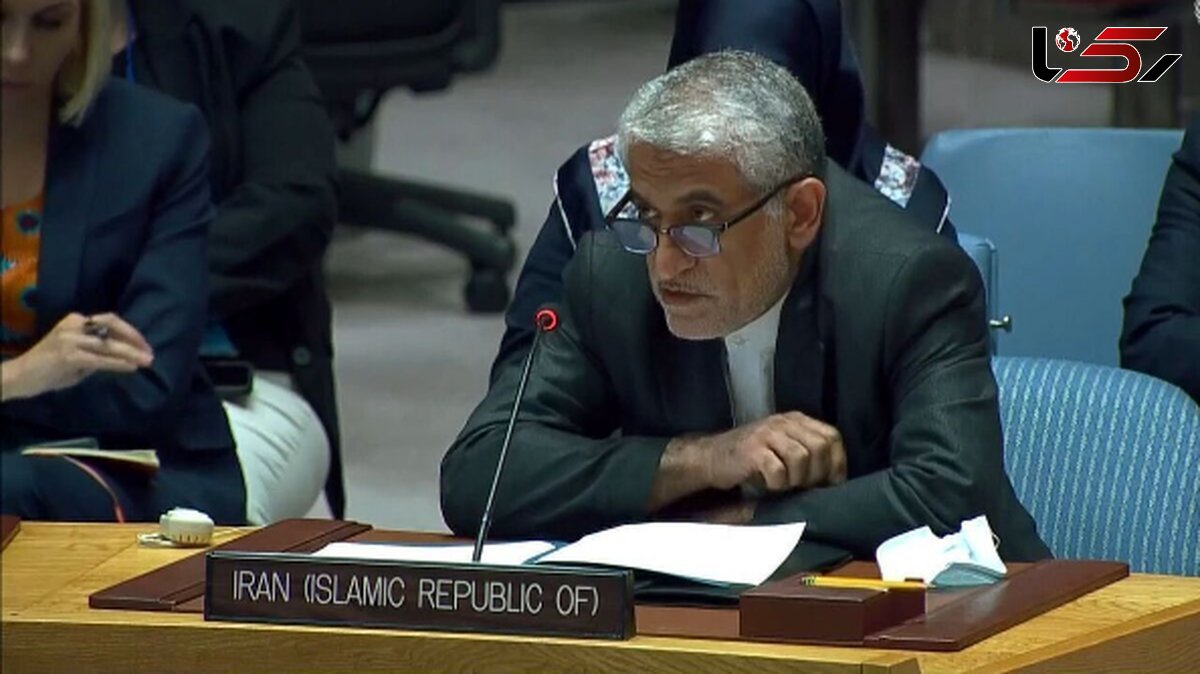Iravani: European Three-Country Plan Is Unrealistic
Rokna Political Desk: The Ambassador and Permanent Representative of the Islamic Republic of Iran to the United Nations, speaking to reporters outside the Security Council regarding the unlawful action of three European countries in misusing the JCPOA dispute resolution mechanism and UN Security Council Resolution 2231, stated: “Iran is committed to diplomacy but will never negotiate under threat or coercion.”

According to Rokna, Amir Saeed Iravani, while reading Iran’s statement to reporters, said: “As you are aware, yesterday, the foreign ministers of three European countries sent a letter to the Security Council and resorted to what they call the ‘automatic re-imposition of sanctions’ process, merely seeking to extort Iran and exert political pressure.”
Iravani added: “At the same time, France and the United Kingdom also requested a closed-door Council meeting to justify this unlawful and politically motivated action and turn the Council into a tool serving their purposes. This meeting has recently concluded.”
He further stated: “Before this meeting, representatives of the three European countries came here and, while closing their eyes to their own failures and fundamental non-compliance with the JCPOA and Resolution 2231, repeated baseless accusations once again. This was another desperate and deceptive attempt to distort reality and legitimize their political actions.”
The Iranian representative outlined the country’s position as follows:
-
The Islamic Republic of Iran firmly rejects and condemns the unlawful action of France, Germany, and the United Kingdom in initiating the snapback process.
-
This action circumvents the JCPOA dispute resolution mechanism.
-
It is an unlawful attempt to revive rescinded resolutions and explicitly violates Resolution 2231.
-
The three European countries lack any legal or moral standing to resort to what they call “automatic re-imposition of sanctions.”
-
Their initiation of the snapback process is fundamentally null and void.
-
The JCPOA dispute resolution mechanism is a step-by-step process.
-
This mechanism was precisely designed to prevent abuse by parties like the three European countries who have failed to comply with their obligations.
-
Some Council members, including China and Russia, have confirmed that the three European countries did not follow the correct procedure.
-
This action is flawed and politically motivated against Iran.
-
The three European countries and the United States were the first to violate the JCPOA; they cannot now claim good faith.
-
The Islamic Republic of Iran has consistently informed the Security Council, the UN Secretary-General, and the European Union, as JCPOA coordinator, of multiple instances of fundamental non-compliance by the United States and the three European countries over the past years. These gross violations are fully documented.
-
Iran’s compensatory actions have been gradual, proportional, and fully legal.
-
The three European countries’ action distorts reality, rewarding the violator and punishing the victim.
-
The situation is clear: the United States withdrew from the JCPOA. The European Union and the three European countries failed to fulfill their commitments, even imposing new and unlawful sanctions.
-
Iran exercised maximum restraint, participated in negotiations, and remained committed to diplomacy. The failure of dialogues resulted from the behavior of the United States and the three European countries, not Iran.
-
While Iran was pursuing diplomacy, its nuclear facilities under safeguards were attacked. This aggression was supported by the United States and justified by the three European countries.
-
Nevertheless, Iran did not abandon diplomacy. We continue engagement with the three European countries and the IAEA. Our hand remains extended for fair negotiations.
-
The reckless attempt to resort to what is called “automatic re-imposition of sanctions” undermines these efforts.
-
This action will be met with a firm and proportionate response.
-
Iran is ready to cooperate constructively with members committed to diplomacy, justice, and peace.
-
Iran is committed to diplomacy but will never negotiate under threat or coercion.
-
Coercive methods are designed to impose dictates, not to resolve issues, and Iran will never yield to them.
-
We believe Resolution 2231 must be implemented according to its original provisions, without political manipulation.
-
Iran remains committed to peaceful nuclear energy and international engagement but will firmly safeguard its rights.
-
The Security Council must not allow itself to be exploited by violators of Resolution 2231 and the JCPOA.
-
The reckless decision of the three European countries has weakened Iran’s cooperation with the IAEA and constitutes an unnecessary and provocative escalation. If unchecked, this path will severely damage the Council’s credibility and unity and place international peace and security at serious risk.
-
We call on all responsible Security Council members to defend the rule of law and firmly reject the unlawful, baseless, and politically motivated attempt by the three European countries to reimpose rescinded resolutions.
-
We support allocating more time to diplomacy to reach a new understanding and agreement.
-
The proposals of Russia and China for a short-term technical extension of Resolution 2231 are a practical step in this direction.
-
However, the three European countries have proposed an extension filled with unrealistic preconditions.
-
This is hypocritical; they demand conditions that should be the outcome of negotiations, not the starting point, fully aware that these demands are unattainable.
-
If they are truly sincere, they should end this double standard and support a short-term, unconditional technical extension of Resolution 2231.
-
The responsibility now lies with the Security Council to make a decision on this matter.
Send Comments